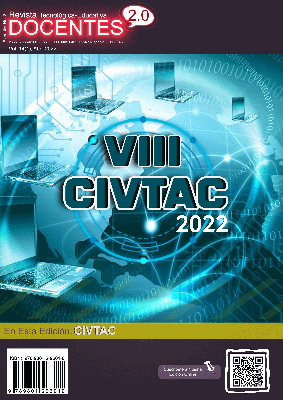Application Of Music Therapy Techniques in The Educational Sector University Students Virtual Modality
 DOI:
https://doi.org/10.37843/rted.v14i1.303
DOI:
https://doi.org/10.37843/rted.v14i1.303
Main Article Content
Abstract
Scientific music therapy is a modern therapeutic technique that has generated a progressive interest among the scientific community. It is used in the health sector for patients subjected to minor invasive interventions to relieve their pain, prevent, restore, increase their physical and mental health. For this reason, the objective was to propose the adaptation based on the five music therapy techniques used in health, to be developed in university education. The research was developed under the theoretical method, positivist paradigm, descriptive-type quantitative approach, and non-experimental design. A questionnaire was used to discover and describe which techniques had been most beneficial to the students. The main findings expressed by the 93 subjects investigated, 49.5% found strategies to improve: mental health, emotional well-being, and creative expression more useful.
On the other hand, 32.3% found it more critical to make group musical improvisations of a Trujillo marinera sung, danced, accompanied by family. For future research, as a reflection of the researchers, we consider working on a program that lasts 16 weeks to measure other dimensions of participants' emotions. It was concluded that adapting music therapy techniques is helpful in the educational sector; above all, those that lead to improving mental health; however, they need to be applied concerning the contents of group interaction between family members and colleagues in the virtual classroom.
Downloads
Metrics
Article Details

This work is licensed under a Creative Commons Attribution-NonCommercial-NoDerivatives 4.0 International License.
Those authors who have publications in our journal accept the following terms:
- When a work is accepted for publication, the author retains rights of reproduction, distribution of his/her article for exploitation in all countries of the world in the format provided by our magazine and any other magnetic medium, optical, and digital.
- Authors will retain their copyright and guarantee the journal the right first to publish their work, which will be simultaneously subject to the Creative Commons Acknowledgment License (Attribution-NonCommercial-NoDerivatives 4.0 International (CC BY-NC-ND 4.0)). That allows third parties to copy and redistribute the material in any medium or format, under the following conditions: Acknowledgment - You must properly acknowledge authorship, provide a link to the license, and indicate if any changes have been made. You may do so in any reasonable way, but not in a way that suggests you have the licensor's endorsement or receive it for your use. NonCommercial - You may not use the material for a commercial purpose. NoDerivatives - If you remix, transform, or build from the material, you cannot broadcast the modified material. There are no additional restrictions - You cannot apply legal terms or technological measures that legally restrict you from doing what the license allows.
- Authors may adopt other non-exclusive license agreements to distribute the published version of the work (e.g., deposit it in an institutional archive or publish it in a monographic volume) provided that the initial publication in this journal is indicated.
- Authors are allowed and recommended to disseminate their work through the Internet (e.g., in institutional telematic archives, repositories, libraries, or their website), producing exciting exchanges and increasing the published work's citations.
- Request of withdrawal an article has to be done in writing by the author to the Editor, becoming effective after a written response from the Editor. For this purpose, the author or authors will send correspondence via e-mail: [email protected].
- The author will not receive financial compensation for the publication of his work.
- All Docentes 2.0 Journal publications are under the Open Journal System (OJS) platform at: https://ojs.docentes20.com/.
References
Bruscia, K. (2014) Definiendo la musicoterapia. https://www.worldcat.org/title/definiendo-la-musicoterapia-tercera-edicion/oclc/957125423
Castillo, S. & Herrera, W. (s.f). Investigación educativa. Fondo editorial de la Universidad Pedro Ruíz Gallo.
Consejo Nacional de Ciencia, Tecnología e Innovación Tecnológica [material sobre los resultados del concurso “Proyectos de Investigación Aplicada en Ciencias Sociales]. https://www.gob.pe/institucion/concytec/noticias/493925-el-concytec-anuncia-resultados-del-concurso-proyectos-de-investigacion-aplicada-en-ciencias-sociales
Del Sol, F., Tejeda, C. & Mirabal. J.M., (2017). Los métodos teóricos: una necesidad de conocimiento en la investigación científico-pedagógica. Revista Edumecentro, 9 (4). http://scielo.sld.cu/scielo.php?script=sci_arttext&pid=S2077-28742017000400021
Fidias, G. (2012) El proyecto de investigación. Editorial Episteme. https://issuu.com/fidiasgerardoarias/docs/fidias_g._arias._el_proyecto_de_inv
Fidias, G. (2006) Mitos y errores en las tesis y proyectos de Investigación. Editorial Episteme. https://drive.google.com/file/d/1WRSfVogu9RhBx_E3t2XwFiOSEYGQJWzc/view?fbclid=IwAR3LaS1pGmXTyScxhBJtK3f2-DGloUOSQZd6HUojNi1xVTx-yf-3cChLIVQ
Hernández-Sampieri, R., Fernández-Collado, C. & Baptista-Lucio, M.P. (2014). Metodología de la Investigación. 6ta edición. McGRAW-HILL
Hurtado, J. (2000). Metodología para la Investigación Guía para la comprensión holística de la ciencia. Ediciones Quirón. https://ayudacontextos.files.wordpress.com/2018/04/jacqueline-hurtado-de-barrera-metodologia-de-investigacion-holistica.pdf
Mauricio, R. E. (2017) Musicoterapia y Rendimiento escolar [tesis para optar el grado de licenciado, Universidad Rafael Landivar]. http://recursosbiblio.url.edu.gt/tesiseortiz/2018/05/22/Mauricio-Edgar.pdf
Marín, S. R. (2019) Principios fundamentales de la investigación científica [Manual de investigación para los estudiantes del Programa de Complementación Académica.]. (estado por publicar) Escuela Superior de Formación Artística Pública “Ernesto López Mindreau” Chiclayo- Perú.
Ministerio de Educación del Perú. (2021). Material sobre los resultados de los docentes ganadores del IX concurso nacional de buenas prácticas docentes – 2021. [edición Bicentenario].https://www.minedu.gob.pe/buenaspracticasdocentes/pdf/lista-de-ganadores-2021-23-12-2021.pdf.
Poch-Blasco, S. (2001) Importancia de la musicoterapia en el área emocional del ser humano. Revista Universitaria de Formación del profesorado. 42, 91-113. https://www.redalyc.org/pdf/274/27404208.pdf
Pluas, S. & Tovar, A. (2022). Material sobre la musicoterapia y su papel en la educación virtual. https://www.unemi.edu.ec/blog-educacion-especial/wp-content/uploads/2020/10/2.4.-Reflexion-Rita-Reene.pdf
Organización de las Naciones Unidas (2020). La COVID-19 y la necesidad de actuar con la salud mental. Obtenido de https://www.un.org/sites/un2.un.org/files/policy_brief_-_covid_and_mental_health_spanish.pdf
Raffino, E. (2020, 20 de octubre). Método Cuantitativo. [Material en línea de los conceptos claves: métodos de investigación].https://concepto.de/metodo-cuantitativo/#ixzz6W0B3mDyU
Resolución Viceministerial del Ministerio de Educación del Perú N° 115-2022. Por la cual se dan los lineamientos a las universidades para el retorno a la presencialidad. https://cdn.www.gob.pe/uploads/document/file/2816764/RVM_N%C2%B0_015-2022-MINEDU.pdf.pdf
Torreles, C., Coiduras, J. Isus, S., Carrera, J. Giorgina, P. & Cela, J. (2011) Profesorado. Competencia de trabajo en equipo: Competencia y categorización. 15(3) https://www.redalyc.org/pdf/567/56722230020.pdf
Zárate, D. & Díaz, V. (2001). Medical uses of musical therapy. Revista médica de Chile 29(2) https://www.scielo.cl/scielo.php?script=sci_arttext&pid=S0034-98872001000200015






